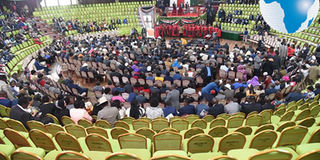Why BBI could be another false start

Delegates attend the launch of the Building Bridges Initiative report at Bomas of Kenya on November 27, 2019. PHOTO | FILE | NATION MEDIA GROUP
What you need to know:
- It is quite evident that the political class views Kenya as a prized kill that should be ‘divided’ among the ‘killers’ and not a treasure to be nurtured for posterity.
- Its singular focus should be on how to minimise the hegemonic power of political elite that utilises economic power and corruption to shape governance and policy-making for its own interest.
This country has a penchant for false starts.
At the dawn of independence, as the real freedom fighters were coming out from forests and other hideouts, children of former homeguards, clerks and colonial remnants were busy scheming how to benefit themselves and maintain the status quo.
Even before the party was over, new rulers had appropriated properties and positions in government.
It took 40 years of sweat, blood and lives of many Kenyans for the ‘Second Liberation’ to be realised.
But by the time its prized jewel, a new Constitution, was promulgated in 2010, it was already mutilated to protect the status quo.
The defeat of Kanu by the opposition alliance Narc was the defining moment.
But although Kenyans were considered the most hopeful people in 2002, it didn’t take long before the ravenous looting, jostling and infighting for power, exemplified by ‘it’s our turn to eat’ slogan, became the order of the day.
KENYA'S LIBERATION
And now, the struggle for the ‘third liberation’ is on. At every turn, the political elite has worked hard to hijack and subvert mwananchi’s clamour for real, positive change.
But even with a progressive Constitution, an hegemonic Executive has, over time, spread its tentacles to all spheres of society, co-opting trade unions and the Opposition to partake of the gravy train and silencing the media, civil society and the international community.
It has eroded the separation of power between itself, the Judiciary and Legislature while overworking, impoverishing and intimidating the academia into submission.
Still, the battle to redeem Kenya’s soul has never been more urgent. If the first liberation struggle was about ‘Black versus White’, the second was ‘Orange versus Red’.
The trouble with the third liberation is that the protagonists and the antagonists are wearing similar jerseys. The ‘wolves’ have invited the ‘shepherds’ to the dining table, leaving the sheep to its own devices.
POSITIVE CHANGE
While the first and second regimes stabilised themselves by banishing freedom fighters and executing, disappearing, jailing and sending into exile progressive voices, the third perfected the art of co-opting opponents into their ranks.
The political class has united around one agenda — its own selfish interest and self-perpetuation.
It is quite evident that the political class views Kenya as a prized kill that should be ‘divided’ among the ‘killers’ and not a treasure to be nurtured for posterity.
Granted, the Building Bridges Initiative (BBI) is not the people’s initiative. It speaks to what ails Kenya and continue to be sold as the panacea, a new clarion call for positive change.
But, in a sense, this BBI is a poisoned chalice. Overall, it correctly identifies all that ails Kenya — lack of national ethos, corruption, ethnic antagonism and competition, tribalism, insecurity and inequality — and gives all the right remedies such as inclusivity, shared prosperity, more devolution, promoting cultural diversity and national ethos.
INCLUSIVITY DEBATE
Still, the BBI falls short of expectations by laying the blame for the mess we find ourselves in on everyone and everything.
By so doing, it fails to zero in on core solutions, opening itself up to cherry-picking and politicking.
It is little wonder, therefore, that while the political class appears to be happy with the BBI, it does not seem to agree on how to move it forward.
In fact, the BBI’s greatest failing is in misdiagnosing inclusivity and insinuating that expanding political positions to accommodate ‘competing political interests’ is the solution to Kenya’s electoral violence.
Look, the ‘nusu mkate’ Government of National Unity had more positions than those proposed by the BBI but that did not cure the hegemonic stranglehold of an imperial presidency.
When Kenyans talk about inclusivity, it is not about increasing the number of leaders at the feasting table. Rather, it is about equal access to power, resources and independence of all governance institutions.
MINIMISE HEGEMONY
Indeed, it is about curbing the runaway inequalities, in which 0.1 per cent of the population (8,300) owns more wealth than the bottom 99.9 per cent (44 million).
If the BBI is the new hope for the ‘third liberation’, its singular focus should be on how to minimise the hegemonic power of political elite that utilises economic power and corruption to shape governance and policy-making for its own interest.
The true solution to Kenya’s challenges is for leaders to be faithful to their oath of office and implement the Constitution in its totality — not another report or referendum.
Certainly not through weekend political rallies drumming up support for expansion of political positions and throwing jabs at opponents — at taxpayers’ expense.
Dr Ido is a governance, management and institutional development specialist. [email protected]




